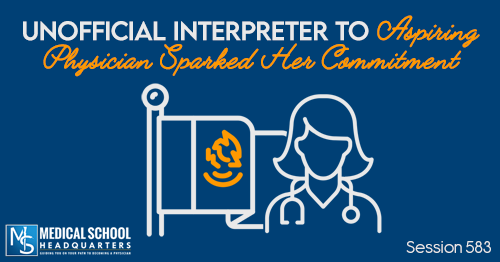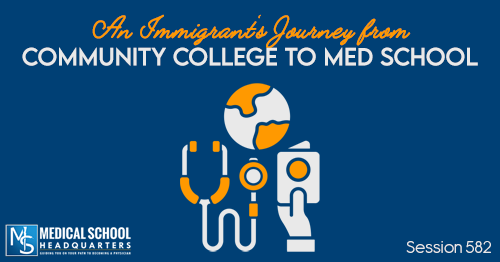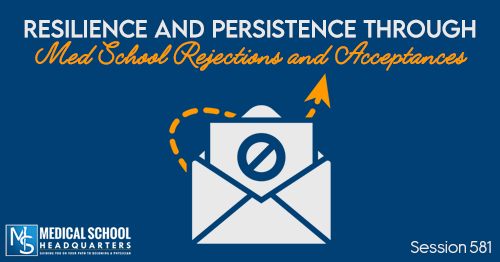Session 579
Annyella is a dermatologist who shares her inspiring journey from premed to medical school and residency, including her struggles with the MCAT and test anxiety. We shed light on the realities of medical education and the path to specialization in dermatology.
For more podcast resources to help you with your medical school journey and beyond, check out Meded Media.
Listen to this podcast episode with the player above, or keep reading for the highlights and takeaway points.
Interest in Becoming a Physician
Annyella first realized she wanted to be a doctor when she was in undergrad. Specifically, she mentions that it was when she chose the Anthropology major and started learning about the history of humans and health, as well as public health, that she began getting interested in medicine and considering becoming a doctor.
Her decision process involved considering the long training period and seeking input from others. She had an uncle who encouraged her, along with a research mentor and even a pharmacist she shadowed. Ultimately, she decided to work as an ER scribe for a year after graduating to see if she liked it before fully committing to pursuing medicine.
Annyella confirms that impostor syndrome was indeed a factor in her hesitation to commit. She mentions that when you don’t know anyone in the field, it’s hard to see if becoming a doctor is attainable.
“There are so many people who make it seem like becoming a doctor is out of reach, and a lot of those people aren’t doctors.”
Annyella’s Premed Struggles
Annyella reflects that the hardest part of being a premed student was the uncertainty and self-doubt. She was uncertain if all the hard work would pay off with medical school admission. She took the MCAT three times. She initially approached it without proper preparation, and she found it so challenging to spend years working diligently without any guarantee of success.
The Power of Maternal Support
Annyella says it was her mother who allowed her to keep going despite the challenges. She mentions that her mom, despite not being in medicine herself, did extensive research on how to become a doctor and constantly encouraged her. Her mother pushed her to keep trying, look for programs that evaluated candidates holistically, and reassured her that she would make a great doctor.
Navigating Work, Study, and MCAT Preparation Post-Graduation
During her first two MCAT attempts, Annyella was working while out of college. For her third MCAT attempt, she committed to focusing solely on studying.
After graduating, she worked at a mortgage company where her mom worked, and was also a part-time ER scribe. She then completed a one-year SMP program at USF before working as a family med scribe while applying to medical schools.
Thought Process Behind Taking an SMP
The SMP (Special Masters Program) Annyella attended was a separate curriculum from the medical school, but ran alongside it. She explains that while medical students had their own classes, the SMP program aimed to mimic the first two years of medical school. It was challenging and involved a lot of studying, but Annyella excelled, achieving a 4.0 GPA.
“The goal of those SMP programs typically is to prove academic readiness.”
Annyella pursued the SMP program due to struggles in her undergraduate studies. She explains that she started as a biochemistry major but didn’t perform well, partly due to the challenging nature of “weed-out” classes and her own lack of sufficient studying. The SMP program provided an opportunity to demonstrate her academic capabilities and readiness for medical school.
Applying to Medical School Despite Uncertainty
Annyella admits that she didn’t know if she was ready to apply the second time. She was initially hesitant to apply again, but her mother encouraged her to do so. Annyella emphasizes that one of the lessons she learned from this experience was to “just do it scared” – she knew she had put in all her effort, even if she was unsure of the outcome.
“Just do it scared because you put all your effort in.”
Annyella’s experience highlights the importance of perseverance and taking risks in the medical school application process. Despite her doubts and initial reluctance, her mother’s encouragement led her to apply anyway. Fortunately, this resulted in multiple interview opportunities and ultimately proving her fears wrong.
Getting the First Acceptance
Annyella describes getting her first acceptance as very exciting. She was accepted to Penn State College of Medicine in Hershey, Pennsylvania, where she ultimately attended. Initially, she wasn’t thrilled about the location. But after visiting for her interview, she was blown away by the program and the peaceful environment, which she felt would be great for studying.
Her mother was overjoyed when she heard about the acceptance. She mentions that her mom was so excited and responded by saying “I knew it,” reflecting her unwavering belief in her daughter’s abilities throughout the challenging application process.
Riding the Med School Wave with Training Wheels
Annyella found medical school to be another level of difficulty, but she felt better prepared than many of her peers due to her SMP experience. She mentions that she didn’t struggle as much as other students typically do in their first year, allowing her to participate in various organizations. However, she found the second year more challenging, especially when preparing for Step exams.
Test Anxiety Unveiled: Step 1 Mirrors MCAT Challenges
Annyella’s experience with Step 1 revealed underlying test anxiety that she hadn’t previously recognized. Despite initial success during dedicated study time, she began experiencing physical symptoms of anxiety, including a racing heart.
This realization helped her connect her Step 1 struggles to her earlier difficulties with the MCAT, highlighting the impact of test anxiety on her performance. Annyella confirms that this was before Step 1 became pass/fail.
“With medical school, you are at a stress level constantly.”
Annyella expresses deep appreciation for her medical school’s supportive approach. They allowed her to take some time off and adjust her schedule to address her anxiety issues, which greatly helped her manage the stress of Step 1 preparation. This experience contributed to her positive view of her medical school.
Red Flags of Test Anxiety: When ‘Just Nerves’ Might Be More
Annyella describes experiencing symptoms like a pounding heart, inability to sleep for days, feeling sick when thinking about studying, and losing weight. She initially dismissed these as being “dramatic,” but when the symptoms persisted and intensified, her family encouraged her to seek help. When diagnosed, she felt relieved to learn her struggles weren’t just her being “crazy” or “dramatic,” but a manageable condition called test anxiety.
This highlights the importance of recognizing that academic struggles, especially with standardized tests, can stem from issues like test anxiety or learning disabilities, even for high-achieving students.
Students need to consider these possibilities and seek appropriate help or accommodations if they’re consistently underperforming on tests despite strong classroom performance.
An Unexpected Passion for Dermatology
Annyella discovered her passion for dermatology during an elective rotation in medical school. She initially took the dermatology elective thinking it would be a “chill” rotation where she could study for other exams, but ended up loving it. She was surprised by the variety and depth of dermatology. She realized it was much more than just treating acne and included inflammatory rashes, procedures, and surgeries.
Strategic Steps to Bolster a Late-Blooming Dermatology Application
To fill the gap in her dermatology experience, Annyella took several proactive steps. She returned to the dermatology program during holidays to rotate and build relationships, while also asking for research opportunities and working on publications.
She joined a dermatology mentorship program and volunteered monthly at a free dermatology clinic in the community. Throughout this process, Annyella focused on building strong relationships with the dermatology program at her medical school.
These combined efforts helped her stand out and compensate for her later decision to pursue dermatology, ultimately strengthening her application and candidacy for residency.
Her Match Day and Why She Ended Ended Up with Dual Application
Annyella’s Match Day experience was filled with excitement and relief, especially given her lingering doubts about matching into dermatology.
Despite advice suggesting otherwise, she chose to dual apply. She was concerned about the intense competition and uncertainty often associated with matching into competitive specialties like dermatology.
Residency Struggles During COVID Era & Carving a Niche in Hair Disorders
According to Annyella, the hardest part of residency was her intern year in internal medicine. She mentions working long hours with only one day off, caring for very sick patients, and dealing with the challenges of being on the frontline during the first year of the COVID-19 pandemic. Despite enjoying the experience overall, she found it emotionally and physically demanding.
Annyella explains that she chose to subspecialize in hair disorders within dermatology. She loves hair disorders and notes that many dermatologists don’t focus on this area, making it a valuable niche.
During her residency, she shadowed specialists, conducted research, and discovered the option of a hair fellowship. This fellowship allows her to combine medical management with surgical techniques like hair transplants, while still maintaining a full-time general dermatology practice.
If Annyella could speak to her younger premed or medical school self, she would offer words of encouragement and perspective. She would emphasize that the MCAT score does not define a person’s worth or determine the kind of doctor they will become – it’s merely one step in the journey.
“The MCAT does not define who you are. It’s not going to determine what kind of doctor you will be.”
Additionally, she would encourage her younger self to pursue her dreams, even in the face of fear and self-doubt. The key, she would say, is to work hard in preparation and be ready to face whatever challenges may arise. These words reflect the wisdom gained through her own experiences and struggles in becoming a dermatologist.
Links:
Annyella’s YouTube Channel: https://www.youtube.com/@TheRealSkinImInMD











